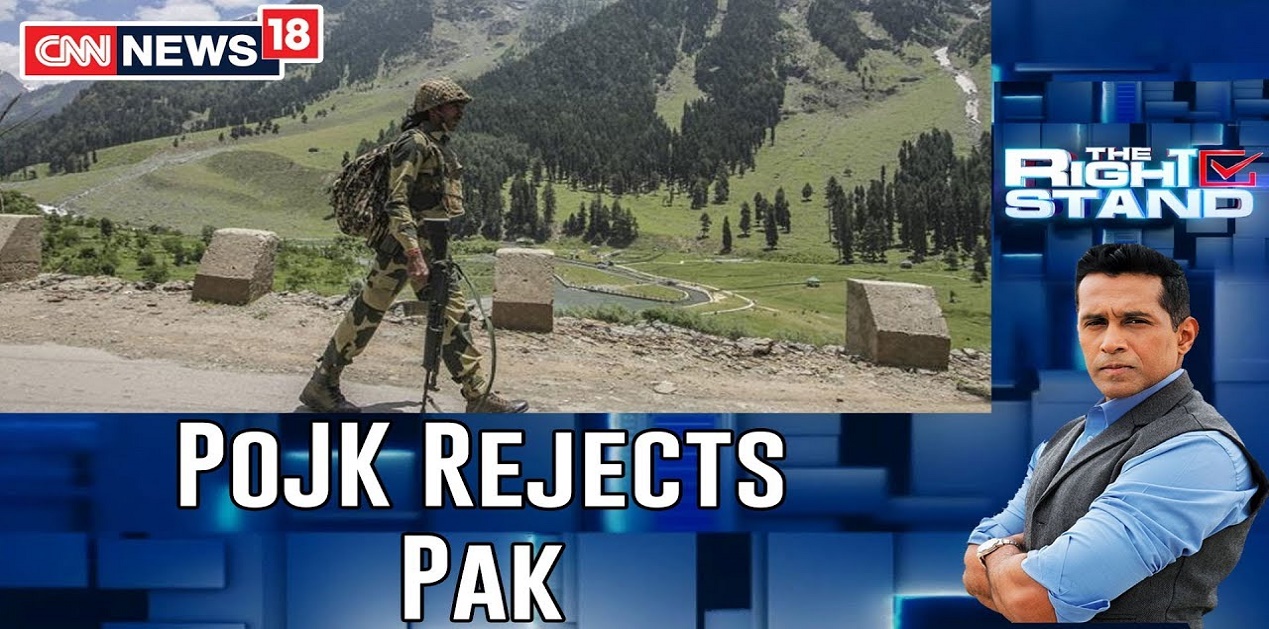It seems that the Indian media is either completely oblivious of devastating developments happening in Pakistan Occupied Jammu and Kashmir, or they hardly seem to bother about it. As one can see, several mainstream media outlets of India ran fabricated stories of brutal violation of human rights by the government of India during the post-370 security and communication lockdown in Kashmir. The reputed international media outlets appeared much under the false propaganda of the Islamist ecosystem in the US, which included Jammat-i-Islami proxies and renowned organizations like Council on American Islamic-Relations (CAIR) and Islamic Circle of North America (ICNA), alleging the Modi government of committing genocide in Kashmir. However, not much can be expected from the international media when Indian national media outlets prefer to run biased, superficial, and fabricated stories on Kashmir.
Given the background stated above, it needs to be brought into focus that devastatingly anti-democratic and brutally repressive measures have been planned by the government of Pakistan and are most likely to be implemented with a heavy hand in PoJK. Pakistan’s Ministry of Kashmir Affairs and the Ministry of Law have drafted the 14th amendment to the interim constitution of so called Azad Jammu and Kashmir (1974). Reportedly, federal authorities have conveyed to the PM of so called AJK that his political survival depends upon the ratification of the proposed 14th amendment by the AJK assembly. Before analyzing its implications and the underlying motivations, a brief mention can be made of its key provisions. The ten-page draft, prepared under the chairmanship of Forogh Naseem, the law minister of the federal government of Pakistan, proposes to bring 15 changes in the interim constitution of AJK (1974). The amendment proposes to restore the legislative powers of the Kashmir Council and also increase its strength to 65, adding 12 new members for the India-Administered Jammu and Kashmir. Out of the 12 seats, five are for Kashmir, five for Jammu, and two are for Ladakh. However, it clearly states that the elections for the newly added 12 seats will not be held until the Indian Kashmir attains independence. The amendment proposes sweeping changes in the appointment of judges.
Further, it puts severe restrictions on forming associations, unions and political parties. A crucial feature of the amendment is a strict ban on political parties and other groupings professing and practicing against the state ideology of Kashmir’s accession to Pakistan. Further, the state has been vested with sweeping powers to monitor and regulate the funding of such parties.
Pakistan always nurtured the designs of forcibly occupying Kashmir since 1947, against the popular will, for which she waged three wars against India, fought a swift war in Kargil heights, and continues to sustain jihadist militancy in Kashmir for last 30 years. This new amendment shatters the last vestiges of Pakistan’s superficial claims of being genuinely concerned about the people of Kashmir. The amendment act wants to usher in an era of ruthless despotism, suppression of human rights, and freedom of expression. Whatever limited autonomy was given to the so called AJK assembly through the 13th amendment has been taken away, and Kashmir Council, a colonial tool of the federal government of Pakistan, once again becomes all-powerful.
The proposed amendment should also be analyzed in the context of China’s strengthening footprint in Gilgit-Baltistan (GB) and PoJK. As the author examined in one his previous papers “China and Pakistan: Original Sinners of Gilgit-Baltistan and ‘Azad Jammu and Kashmir’: A Tale of Genocide, Covert Demographic Engineering and Suppression,” (SADF, April 2020), this author discussed at length about the last fifty years of genocide, slavery and suppression in GB and AJK. The author informed that China-Pakistan nexus has displaced large numbers of local population for their developmental projects. The local shia community has been facing innumerable atrocities at the hands of salafi extremists. GB and AJK have been flooded with retired army personnel of Pakistan and the cadres of Jaish and Lashkar. Further the government of AJK has always been a puppet government and its authority has been increasingly diminished over time. This new amendment is in line with Pakistan’s traditional intent of ruling Kashmir like a colony with a heavy hand. Further, with the entry of CPEC, the stakes of China have also become stronger. Reportedly, the CPEC Authority, soon to be formed, will have overriding powers. Interestingly, the army will have a major control in it. To top it all, Beijing will have a firm grip over it.
Across the world, Kashmir activists and diaspora has condemned the 14th amendment. In a webinar organized by Jammu Kashmir International People’s Alliance, Junaid Qureshi, director of the European Foundation for South Asian Studies, lashed out at the Pakistan government and said that “the hypocrisy and the abundant mismatch between Pakistan’s statements invoking the UN resolutions and its actions on the ground, which clearly point to any absence of any intention of being serious about the referendum also come through in the draft 14thamendment bill (ANI, July 10, 2020).” Sajjad Raja, the Chairman of National Equality Party JKGBL said, “the people of PoK did not recognize the 1974 act because it was an indication of our slavery. A freedom-loving person cannot accept such slavery. Further, he observed, “Today even the Prime Minister of so-called Azad Kashmir is agitating against the Pakistani bullying and forcing constitutional changes through 14th amendment act in 1974 constitution, down our throats in the name of Islam and brotherhood (ANI, July 10, 2020)
The AJK cabinet has rejected the 14th amendment “in totality (Dawn, July17, 2020).” The cabinet members believe that the more significant motive is once again to transfer the fiscal and administrative power to Kashmir Council. The Kashmir Council was created under the 1974 interim constitution of AJK to serve as a bridge between Islamabad and Muzaffarabad. However, over time, it evolved into a mighty body alleged to be running a parallel government in AJK. It became a center of corruption and bureaucratic ruthlessness. The Kashmir council was entitled to a whopping 20 % of the income tax of AJK to run its inflated secretariat expenditures in Islamabad. However, the 13th amendment stripped it of its legislative and administrative powers, which did not go down well with the federal bureaucrats. Hence, a massive effort is in progress through the 14th amendment to restore its power and resources.
Interestingly, in the Indian-Administered Kashmir, the Modi government is empowering the local self-governing bodies ( panchayats and city councils), reaching out to ordinary people, overhauling the governance system, going all-out against the jihadist ecosystem and rooting out the corruption, against heavy odds and Pak-sponsored terrorism. Pakistan-supported terrorists are killing the panchayat leaders, civilians, and politicians to destroy the people’s faith in democracy.
Whereas, on the Pakistani side, one witness systematic ethnic cleansing campaigns against minorities, empower the Sunni-jihadist groups, exploitation of the local resources in a colonial style and execution of dissident voices. However, Indian media and experts, as usual, fail to communicate this to global bodies like UN, OIC, and human rights organizations and expose China-Pakistan’s inhuman atrocities in AJK and GB. Also, the prestigious global media platforms of the western liberal world, engaged in a tirade against India for restrictions on 4G internet are maintaining a shocking silence, which proves either they are inefficient and poorly trained in research and journalism or they are deliberately doing it.
Having said this, it is more than obvious where we need to focus our efforts and energies.
(The paper is the author’s individual scholastic articulation. The author certifies that the article/paper is original in content, unpublished and it has not been submitted for publication/web upload elsewhere, and that the facts and figures quoted are duly referenced, as needed, and are believed to be correct). (The paper does not necessarily represent the organisational stance... More >>
Image Source: https://i.ytimg.com/vi/yaX1XVpvTEo/maxresdefault.jpg










Post new comment